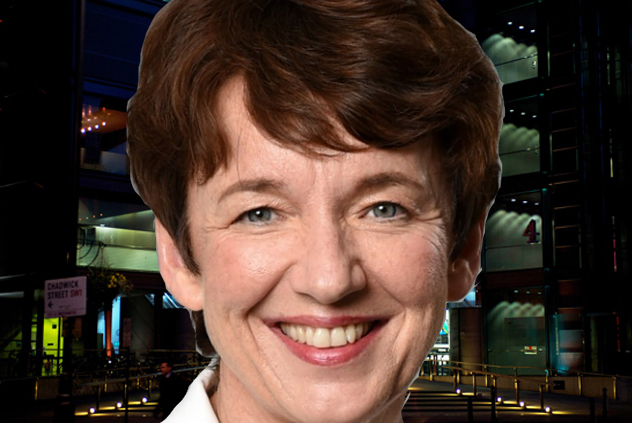Requiem for a heavyweight as Dawn Airey returns to frontline broadcasting

Media Leaders
New Channel 4 chair Dawn Airey has certainly become a British Broadcasting Heavyweight. But look at her career history and it’s difficult to detect a genuine passion for TV.
F Scott Fitzgerald memorably wrote in his posthumous (unfinished) novel The Last Tycoon, that “there are no second acts in American lives”.
This half-aphorism certainly doesn’t apply to Dawn Airey, whose appointment as Interim chair of Channel 4 has just been approved by UK Culture Secretary Nadine Dorries.
Many see her new role as overseeing the privatisation and sale of Channel 4, which until recently appeared to be a certainty.
As Dorries looks to be currently chiefly occupied with her well-publicised animus towards the BBC, Channel 4 may be reprieved.
For a while, at least.
Possibly learning that Channel 4 is not (as she previously thought) “in receipt of public money” and in reality, is funded mainly from advertising, may have changed her mind.
Ostensibly, Airey’s wide and varied industry experience puts her in good stead to preside over a sell-off, if Dorries turns her attention from bashing Auntie.
There may be some head-scratching among industry veterans at the choice of Airey though.
As CEO and chair of Channel 5, she was at the broadcaster when it was sold at the ‘bargain’ rate of £99.1m to Richard Desmond’s Northern & Shell.
Of course, this may well have been a teachable moment for Airey in terms of valuing the sale price of UK broadcasters, but it does look to some as a counterintuitive choice.
I expect Dawn’s hard-nosed, no-nonsense persona could have appealed to Dorries, a broadcasting neophyte (excepting her participation in I’m a Celebrity… Get Me Out of Here! in 2012).
Others in the industry noted that Airey’s penchant for ‘plain-speaking’ can (and has) been often mistaken for boorishness or incivility.
Whatever the case, it doesn’t seem to have done her storied career any harm, as Airey has enjoyed a series of high-profile roles at prestigious companies throughout her working life.
Early success at ITV provided the initial impetus for her years in broadcasting, as she progressed to ever senior posts at Channel 4, BSkyB (now Sky) and, most notably, Channel 5.
The elephant in the room with Airey is likely to be the failed launch of multi-media company Iostar in 2007, where she was chief executive for just eight days before leaving.
Michael Grade, Dawn’s former boss at Channel 4, came through with the offer of a prestigious role as head of global production.
But in less than a year, Airey was off, decamping back to Channel 5.
Grade was said to be ‘livid’ and ‘apoplectic’ with fury at this egregious example of biting the hand that feeds, or no good deed going unpunished.
But since Grade did a moonlight flit from his role as BBC chairman to join ITV as executive chairman in 2006, it was difficult for many to feel much sympathy with him.
One thing you can never accuse Dawn Airey of is being a TV quasi-luvvie.
She rarely talks about TV programming other than in commercial terms and seems to relish cultivating the air of a philistine. This is odd, since she’s a Cambridge graduate and is currently chair of the National Youth Theatre.
Indeed, if one has to think of one TV show associated with Airey from her many years in broadcasting, it’s most probably Naked Jungle (Channel 5, 2000) the one-off gameshow where viewers were treated (if that’s the right word) to the sight of the late Keith Chegwin’s untethered junk.
The quote mostly associated with Airey is her infamous reference to Channel 5 as the home of “films, football and fucking”, which, akin to Queen Mary and Calais, have become indelibly linked with her.
That and Adam Faith’s last words in March 2003: “Channel 5 is all shit, isn’t it? Christ, the crap they put on there. It’s a waste of space”
Airey’s lack of obvious pretension may be refreshing, but the downside is that her seeming absence of genuine passion for the medium has some wondering she may have been more of a fit with the likes of McKinsey & Company.
Or managing a nationwide burger chain. Or running an estate agency.
I say good luck to Dawn. By virtue of her sharp elbows and longevity, she has surely earned the sobriquet of ‘British Broadcasting Heavyweight’.
And who knows, if she makes a decent fist (in the government’s eyes) of the Channel 4 gig, maybe Nadine Dorries will parachute her into the BBC.
Then Airey can experience a measure of schadenfreude, recalling that early in her career: “I applied for the BBC and the buggers rejected me.”
Stephen Arnell began his career at the BBC, moving to ITV where he launched and managed digital channels. He continues to consult for streamers and broadcasters on editorial strategy. He currently writes for a variety of publications (including The Spectator, Independent, Guardian, Broadcast etc) on film, TV and cultural issues. He is also a writer/producer (including Bob Fosse: It’s Showtime for Sky Arts) and has just completed his first novel.
NOW READ: Editor’s comment – Channel 4 may be just a ‘corner shop’, but it’s our corner shop
Media Leaders: Mediatel News’ weekly bulletin with thought leadership and analysis by the industry’s best writers and analysts.
Sign up for free to ensure you stay up to date every Wednesday.




